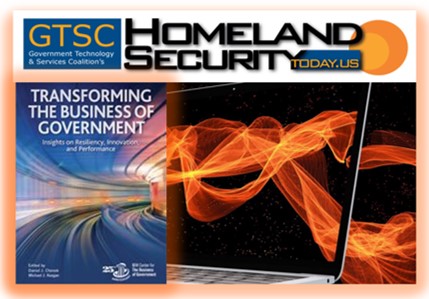
Quantum Technology and Homeland Security

The development of quantum technology has the potential to reshape the world’s economic and social landscape. The U.S. government understands the national security importance of developing this field and has already invested significant resources in developing quantum information science. Quantum technology holds significant promise for enhancing the homeland security sector through improved cybersecurity, threat detection, disaster response, and infrastructure resilience.
In Chapter 9, “Quantum Technology Challenge: What Role for the Government?” of the IBM Center for The Business of Government book, Transforming the Business of Government: Insights on Resilience, Innovation, and Performance discusses what quantum technology is and how it could change government functioning. It also examines the impact on cybersecurity and cryptography, as well as how quantum might impact environmental sustainability and labor, and offers advice for effective policymaking to make the best use of this emerging technology. The insights from the chapter provide a valuable framework for understanding how quantum advancements can be harnessed in homeland security. This column summarizes the chapter’s key elements, focusing on their implications and applications for homeland security.
- Enhancing Cybersecurity
Quantum computing poses both opportunities and threats to cybersecurity, which is a critical aspect of homeland security. The chapter discusses the potential of quantum technology to break current encryption methods, such as asymmetric key algorithms, posing risks to military communications, critical infrastructure, and financial systems. To address this, quantum-resistant encryption algorithms must be developed and implemented.
For homeland security, quantum technology can provide advanced encryption methods that are resilient to attacks from both classical and quantum computers. Quantum key distribution (QKD), a method that uses quantum mechanics to securely share encryption keys, could be a game-changer in safeguarding communication channels for government agencies and first responders. This would ensure that sensitive data remains secure even as quantum capabilities evolve.
- Quantum Computing in Threat Detection and Intelligence
Quantum computing’s ability to process complex datasets rapidly could enhance threat detection capabilities by improving data analysis in intelligence operations. For example, analyzing patterns in sensitive communication data to identify potential terrorist activities or detecting cyber intrusions in real time could be more effective with quantum algorithms.
The chapter emphasizes the necessity for hybrid quantum-classical systems, which can be leveraged in homeland security to augment existing artificial intelligence (AI) systems. This hybrid approach would enable faster data processing, improving the identification of security threats and allowing for quicker decision-making in crisis situations.
- Strengthening Critical Infrastructure Protection
The chapter highlights the risk posed by quantum decryption to critical infrastructure and underscores the need for robust cybersecurity measures. In the context of homeland security, protecting vital infrastructure such as power grids, water systems, and transportation networks is paramount. Quantum technology can aid in developing advanced simulation models to predict and prevent failures or attacks on these infrastructures.
Quantum-based algorithms can optimize logistics and emergency response efforts, ensuring that resources are allocated efficiently during natural disasters or terrorist attacks. Additionally, quantum computing can be used to simulate potential attack scenarios on critical infrastructure, allowing for the development of more resilient defense strategies.
- Quantum Applications for Disaster Response and Management
Homeland security is not limited to preventing man-made threats; it also involves preparing for and responding to natural disasters. The chapter discusses the sustainability and environmental applications of quantum technology, such as optimizing energy usage and improving logistics. In disaster response, quantum computing could enhance predictive modeling for natural disasters like hurricanes, earthquakes, and wildfires, enabling more accurate forecasts and proactive resource deployment.
Quantum algorithms can also improve supply chain logistics during emergencies by quickly identifying the best routes for delivering aid and equipment. This could be particularly beneficial in large-scale disaster scenarios where time-sensitive responses are critical.
- Developing a Quantum-Ready Workforce for Homeland Security
The chapter emphasizes the importance of a skilled workforce to fully leverage quantum technology. In the context of homeland security, training and familiarizing personnel in quantum information science is crucial to ensure that agencies can integrate quantum advancements into their operations effectively. Programs that focus on quantum education and hands-on training should be expanded within homeland security agencies to build a quantum-ready workforce.
Moreover, collaboration with academic institutions and private sector partners, as suggested in the chapter, can help accelerate the development of quantum skills. This could involve creating joint training initiatives that combine homeland security scenarios with quantum computing tasks to develop practical problem-solving skills in real-world applications.
Recommendations for Homeland Security
Based on the chapter’s insights, several strategic actions are recommended for integrating quantum technology into homeland security:
- Invest in Quantum-Resistant Encryption: Homeland security agencies should prioritize research and development of quantum-resistant cryptographic methods to safeguard critical communications and data.
- Adopt Hybrid Quantum-Classical Systems: Leverage hybrid quantum computing to enhance data analysis capabilities, improving threat detection, intelligence operations, and disaster response.
- Strengthen Collaboration Across Sectors: Establish partnerships with academic institutions, private companies, and international allies to advance quantum research, share best practices, and develop a quantum-capable workforce.
- Expand Quantum Training Programs: Incorporate quantum education and training initiatives into homeland security agencies to prepare personnel for the emerging technological landscape.
- Use Quantum Simulations for Infrastructure Protection: Develop quantum-based models for simulating attack scenarios and disaster impacts to enhance the resilience of critical infrastructure.
Conclusion
The insights from the chapter on quantum technology provide a strategic roadmap for applying quantum advancements in the homeland security sector. By proactively addressing the risks and leveraging the opportunities that quantum technology presents, homeland security agencies can strengthen their capabilities in cybersecurity, threat detection, disaster response, and infrastructure protection. Ensuring a quantum-ready workforce and fostering collaboration across sectors will be essential for the effective integration of this transformative technology.
Click here to read Chapter 9 in full.
Also published as a column at: https://www.hstoday.us/featured/quantum-technology-and-homeland-security/



